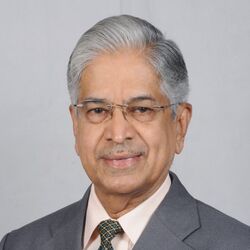Highlight Lecture 3: Space Exploration to benefit Humanity on Earth
Day: Friday 9 May 2025
Time: 09:00 - 09:30
Location: Grand Ballroom, India International Convention & Expo Centre (IICC) - Yashoboomi
The "outer space exploration" utilising the advanced space technologies and also generations of valuable space data provide excellent tools for finding the right solutions to many of the problems faced on earth. Today space has become an integral part of National development all over the globe by utilizing well-structured applications programmes in a variety of domains like earth observations, communications, disaster management, navigation, better understanding of atmospheric sciences and weather, interplanetary exploration and many more. Space exploration is largely governed by the Outer Space Treaty signed 58 years ago in October 1967. This international agreement mandates that outer space exploration has to be utilized for peaceful usage only and it must take into account the interests of all countries, regardless of their scientific or economic progress. The main objective of the treaty was to ensure that space derived benefits should not be used by only a few space faring countries, instead the emphasis is on space exploration on a shared endeavor. The purpose of the treaty is to serve as the foundational pillar for multilateral space governance and strictly stipulates that no nation can claim sovereignty over celestial bodies.
One of the important objectives of the space exploration is to ensure that the benefits of all scientific advancements made so far should reach gradually the entire humanity on earth. It should assist in creating and enhancing economic opportunities for improving the quality of life. The excitement of space exploration no doubt has been inspiring future generations to pursue careers in STEM areas and act as a catalyst to drive innovation particularly in advanced S&T fields. It is imperative that in future space exploration, most of the activities have to be undertaken by fostering active international cooperation not only to bring down the cost and but also to share the experience and expertise to achieve faster growth for the global good.
Space has made great inroads in every domain and space activities have progressed by leaps and bounds they are no longer carried out by just governments alone. With the growth of private Space entrepreneurship and innovation opportunities explorations are now open to Private companies, small teams and even a few individuals. Space tourism is attracting a lot of attention worldwide and serious efforts are on to bring down the cost. Virgin Galactic, Blue Origin, SpaceX, Boeing company and a few more are already have made tremendous progress in all exploration areas. Serious attention is being continued to offer cheaper suborbital flights, orbital hotels, moon trips, space tourism etc,.
Space has made deep inroads in several vital domains to improve the lives of the common man such as space-based remote sensing for assessing natural resources, for monitoring environmental changes, for understanding climate patterns, for optimizing crop yields, for improving irrigation practices, for monitoring crop health, for assisting in disaster management and many more such vital areas thus making several crucial contributions, for meeting the sustainable development goals set by UN. More and more such space technologies are being more and more used in national governance too.
While the exploration activities have made phenomenal progress in almost all domains humans are still pondering over several fundamental questions like
i. How did the universe form?
ii. What are the laws of nature at extreme scales?
iii. Are we alone and does life exist elsewhere in the universe? and
iv. Answers to many more such unanswered questions.
All these aspects will be deliberated in the talk.

